|
Edited
by Frank R. Shaw, FSA Scot, Dawsonville, GA, USA
Email:
jurascot@earthlink.net
A few months back I was
asked by Tom McNally, Dean of Libraries at the University of South Carolina,
to speak at “A Tribute to Dr. Patrick Scott” upon his retirement from the
faculty of the university. I immediately accepted. Tom had asked others to
speak about the academic side of Patrick’s life, but he wanted me to speak
about Patrick as one from the “outside” giving me all the latitude in the
world to come up with something a bit entertaining and hopefully
interesting.
The retirement bash was held
in the new addition of the library and extra chairs had to be brought in to
accommodate those present. I interpreted the huge crowd to be an indication
of just how much Patrick is thought of by his colleagues and revered by his
friends. Patrick is a man I greatly admire and can be classified as one of a
small handful of heroes in my life.
I later told Patrick that I
hoped he would not mind if I put my words on my web site and, ever the
modest gentleman, he replied, “Only if you clean up the superlatives”. I
chuckled and moved on to another topic of conversation knowing that if I
complied with his wishes there would be no need to put the talk on line. So,
with all due apologies to Dr. Scott, here is what I said to that packed
crowd.
“A Tribute to Dr. Patrick
Scott”
A Noted
Robert Burns Scholar
By
Frank R. Shaw
Most of us are familiar with
some words coined by William Shakespeare and tonight I wish to borrow a
phrase of his. I enjoy playing with words so, with great respect for
Shakespeare, let me quote a line from Marc Antony as he pays tribute to
Julius Caesar:
Friends, Romans, countrymen,
lend me your ears;
I come to bury Caesar,
not to praise him.
But tonight I wish to
reverse the words bury and praise and simply say
that with Patrick Scott, I come to praise him, not to bury him. This is not
a difficult task and if I may borrow a phrase from the New Testament, Luke
says, “Woe to you when all speak well of you”. But let’s not stop there;
let’s play with it a bit. Here’s what it does not say, “Woe to you when all
good men speak well of you”. That is what I plan to do this
evening, speak well of Patrick Scott!
Patrick is an unusual man,
always busy,
loves his work,
proud of his family,
not a braggart,
unassuming
at peace with himself
and he is a gentleman!
He has represented the
University of South Carolina with dignity and grace. His articles appear in
the better scholastic journals and magazines. You never hear him speak well
of himself or his work. Yet, his presence is not confined to Columbia, South
Carolina. He is as rare as the rare books he has been the keeper of over the
years, and his contribution to literature keeps popping up in the most
unusual places. For instance, in 2008 I decided to read, once again, the
classic Treasure Island, and one day while browsing in a Barnes and
Noble book store I picked up a copy which had these words on the cover, “Treasure
Island by Robert Louis Stevenson with a New Introduction by Patrick
Scott”. Folks, it doesn’t get much better than that! But it did. I read the
18 pages of the new introduction by Patrick as well as the 200 pages of the
book and quickly came to the conclusion that the introduction was as rare
and well written as the book itself!
Speaking of rarity, there is
a rare club in Georgia. It is called The Burns Club of Atlanta. It is the
second oldest social club in the city. It has met the first Wednesday night
of each month since 1896. It is built just like the house Robert Burns, the
Bard of Scotland, was born in. The club, by charter, has only two honorary
members and both of them are present tonight - G. Ross Roy and Patrick
Scott. (Spontaneous applause broke out from the audience.)
Of all the titles Dr. Scott
has held since coming to this university, of all the positions he has held
here on this campus, as a Scotsman myself, I must ask you this - do you know
he is a Robert Burns scholar? I have called on him many times while writing
a speech or preparing an article for my web site Robert Burns Lives!.
I learned a long time ago as I have traveled to various states speaking
about Burns that many profess to be Burns scholars, but I’ve also learned
that few really are.
Tonight we are honored to
have “The Dean of Burns Scholars” in attendance, G. Ross Roy, no question
about that statement. Many others feel the same way. Newspaper writer Jim
Gilchrist, who wrote for The Scotsman, once referred to Dr. Roy in an
article as the “Chairman of the Bard”. No surprise there. Ross, to me,
stands alone.
But I can also name several
of the top Burns scholars in the world. Naturally, a lot of them are in
Scotland, so I will not tarry long on this point. There is Gerry Carruthers,
University of Glasgow and Head of the Centre for Robert Burns Studies at
that distinguished university. There is Robert Crawford at the University of
St Andrews whose recent book on Burns, in my opinion, will be a classic for
the next 20 years. Ken Simpson, who has been played an integral part in the
publication of Studies in Scottish Literature with Ross Roy and
Patrick Scott, may be retired from Strathclyde University, but ears still
perk up when Ken writes a new article on Burns. There are many other Burns
scholars that time does not allow me to list, but suffice it to say, if you
placed all of the Burns scholars in the world in a room together, right in
the middle of them would be Patrick Scott, who can hold court with any of
them.
Two of the scholars
mentioned above were asked by me to contribute to this presentation. Here is
part of what Ken Simpson said:
“From my first visit to the
University of S. Carolina in 1988, Patrick Scott has been kindness itself.
Nothing is too much trouble for him, be it meeting at airport, recommending
where to lunch, finding a book, or answering a question, for Patrick is an
encyclopedia of knowledge. I’ve been to USC often enough to have seen him in
action across the range of professional activities, from teaching his
beloved Victorian poets or descriptive bibliography to setting up exhibits
and organizing conferences. In the work-place I’ve admired his unfailing
ability to solve problems and smooth out difficulties…I wish Patrick a long
and happy retirement, but it will be a busy one, because that’s the person
Patrick is. He may have retired on paper, but the reality, as we know, is
quite different; and we are the beneficiaries.”
Gerry Carruthers wrote:
“Patrick Scott is a man
whose fine scholarly judgment can be depended upon. He knows the value of
going back to ‘basics’: getting the book-history right, the publishing
history right so as to make sound literary judgments. The hallmark of his
career has been a combination of the knowledge of what is today called
‘material culture’ (the real objects and circumstances behind cultural
productivity) along with the most sophisticated reading skills. He is a
highly collegial man, who supports the work of others with huge generosity
of time and he is also someone that other scholars rightly regard as one of
the ‘policemen’: someone who can quickly spot humbug and bad scholarship.
Tough-minded and immensely kind, a rare cocktail of a human being (!),
Patrick Scott is a good scholar and a good man.”
So who is Patrick Scott?
Susan and I were recently in London and visited the Samuel Johnson House.
Those who run the house actually provide tables and chairs in each room for
you to sit, study and enjoy Johnson’s home. We saw many editions of his
dictionaries. They had made copies for visitors’ use and one dictionary in
particular appealed and amused me. A page had come loose from the volume
and, as I looked it over, one of the words on it was oats. Johnson,
in his humor, had explained that in England oats were fed to animals while
Scots used oats for their own nourishment. Interestingly, some Scots
couldn’t see or appreciate his humor.
Back at home Susan and I
were talking about the Johnson dictionaries one evening as we were sitting
in front of a blazing fire and enjoying a glass of wine. We started talking
about Patrick and thinking of words to describe him. After all, I still had
a paper to write! Here are a few examples we came up with – thorough,
scholar, devoted, loyal, kind, gentleman, dedicated, steadfast, cheerful,
compassionate, considerate, and the two words we could not get away from –
hard worker! I doubt it took over a minute to come up with this short list,
but we agreed we could sit there an hour and not finish a list that could go
on and on. There is one thing in common, however, about all of these
words…they describe our honored professor tonight. So, I ask, what is the
common denominator of these words? Simple enough, right? Look up each in the
dictionary and you will find a picture of Patrick Scott.
In April of 1910, the 23rd
actually, a former president of these still great United States gave a
speech entitled “Citizenship in a Republic” at the Sorbonne in Paris. He was
our 26th president and you will recognize these words from Teddy
Roosevelt.
“It is not the critic who
counts; not the man who points out how the strong man stumbles, or where the
doer of deeds could have done them better. The credit belongs to the man
who is actually in the arena, whose face is marred by dust and sweat and
blood; who strives valiantly; who errs, who comes short again and again,
because there is no effort without error and shortcoming; but who does
actually strive to do the deeds; who knows great enthusiasms, the great
devotions; who spends himself in a worthy cause; who at the best knows in
the end the triumph of high achievement, and who at the worst, if he fails,
at least fails while daring greatly, so that his place shall never be with
those cold and timid souls who neither know victory nor defeat.”
Where is this man’s arena we
honor tonight? It is not William Brice Stadium where Steve Spurrier patrols
the sidelines. Neither is it Sarge Field, home of two consecutive NCAA
baseball championships and where the once great Bobby Richardson coached. It
certainly is not Colonial Life Arena where Frank McGuire held court many
years ago.
Where has his arena been all
these years?
This man’s arena is in the
stacks with the books.
It is in the thousands of
papers he graded burning the midnight oil.
It is in his office pouring over manuscripts
hundreds of years old.
It is in the classrooms were his
students were taught.
It is in the vault with the
treasures of this great university.
It is in the
heart of a man we know, respect, and love.
His arena was and always
will be the University of South Carolina!
Thank you, Patrick, for
blessing our lives with your presence! (FRS: 2.16.12)
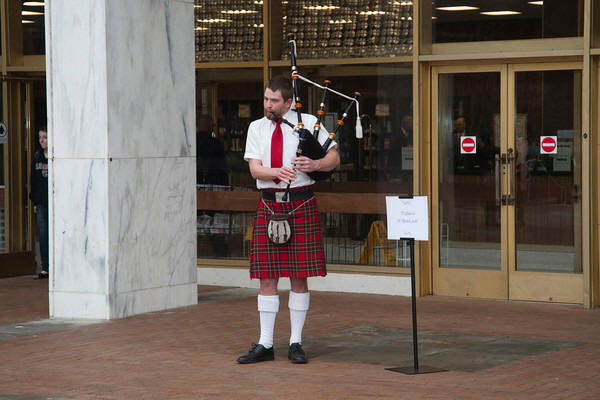
Guests greeted by piper as they arrive for
the festivities honoring Dr. Patrick Scott
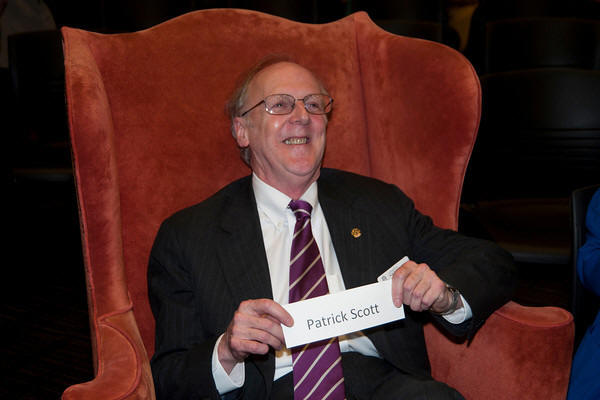
Enjoying the evening in the honoree's chair
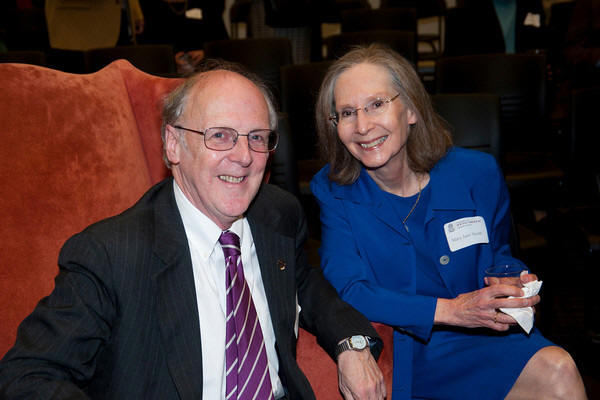
Dr. Scott and his wife Mary Jane (M.J.)
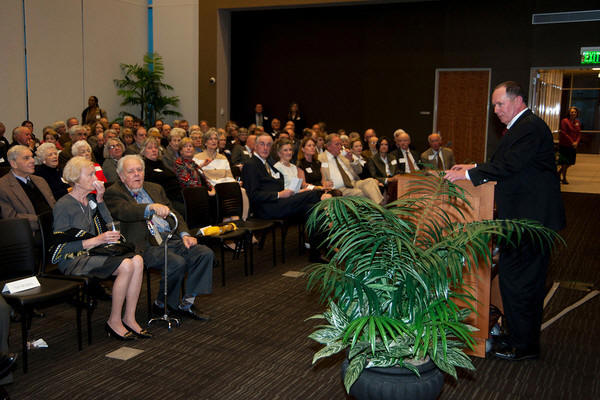
Dean of Libraries Tom McNally begins the introductions
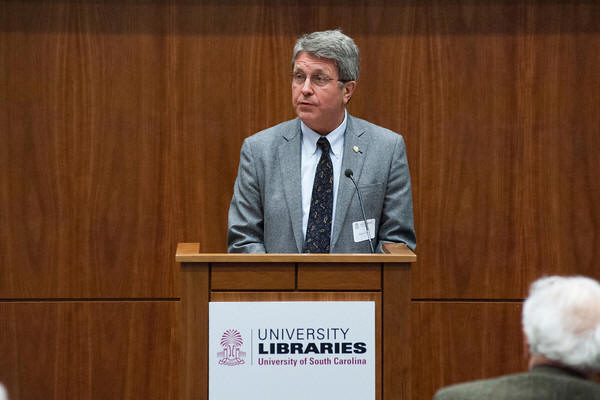
Dr. Steve Lynn speaks on behalf of Patrick's USC colleagues
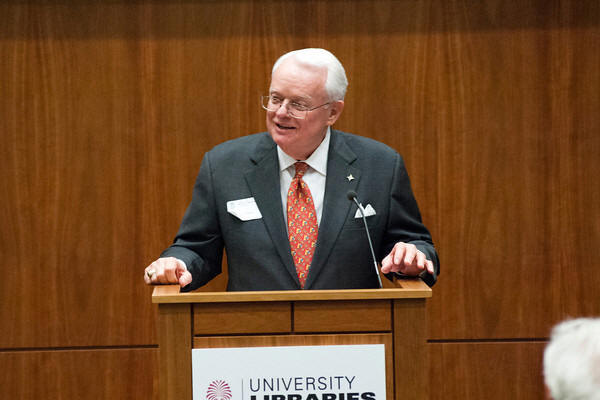
A Salute to Patrick Scott by Frank Shaw
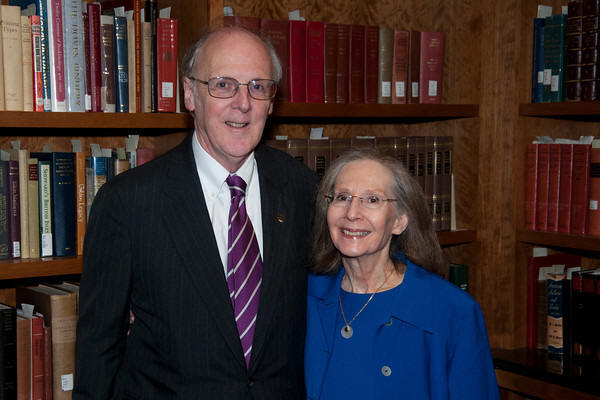
Patrick and M.J.
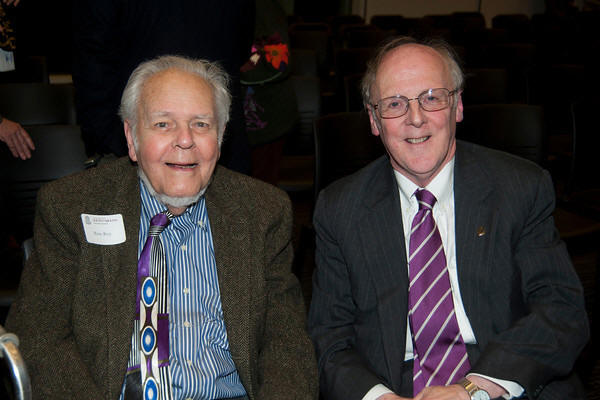
What a team! Ross Roy and Patrick Scott in a true Auld Lang Syne moment
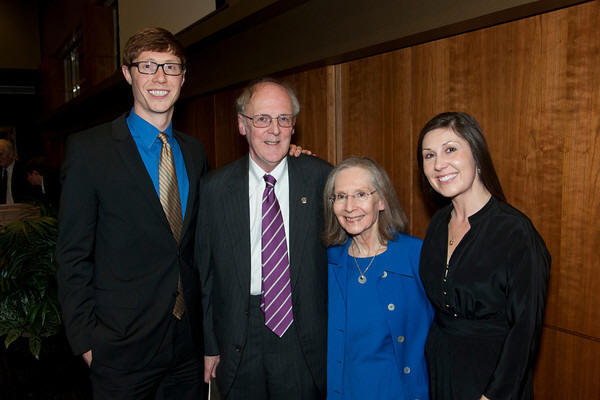
The Scott family - Thomas, Patrick, M.J. and Nancy
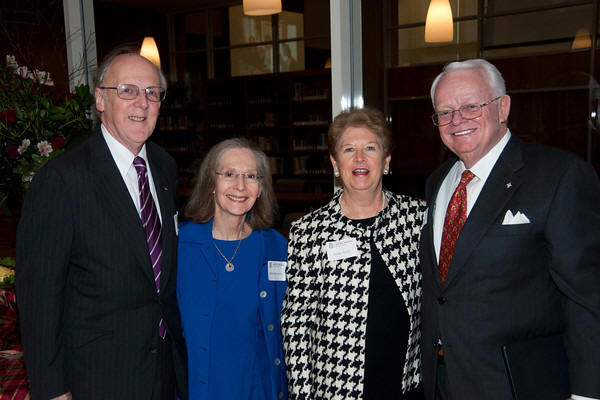
Friends forever - Patrick, M.J., Susan and Frank Shaw (Love that Furman tie
of Dr. Scott's!) |

